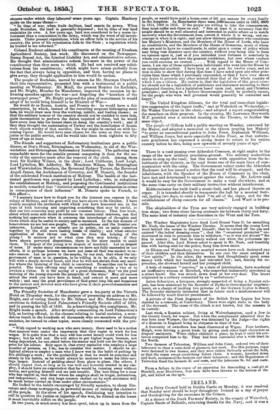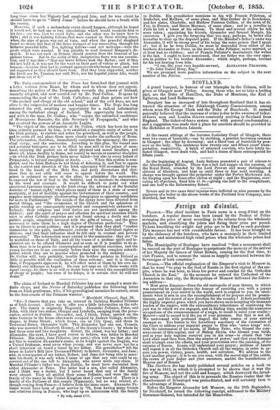IRELAND,
At a Privy Council held in Dublin Castle on Monday, it was resolved that Sunday next should be kept thronghont Ireland as a day of prayer and thanksgiving for the successes in the Crimea.
At a dinner of the Iverk Farmers' Society, in the county of Waterford, Captain Steele of Belleisle, returning thanks for the Navy, said it was a
long time since her Majesty had employed ,him, and he was afraid he should have to go to "Davy Jones" before he should have a brush with the enemy.
However, if such a melancholy event should happen, although he hoped it would not, he had one or two consolations which would reconcile him to his fate ; one was, that he could fight, and the other was he knew how to fight ; and it was fighting fellows that were wanted in these stirring times, when the pipe of peace was out of tune, and when the peaceful shepherd heard no music but that of the fierce trumpet of war resounding through his hitherto peaceful hills. Yes, fighting fellows—and not milksops—were the goods which were wanted. It was pitiable to read General Simpson's de- spatch. It was not such as Britain should receive from the General of her gallant forces. But in the midst of this indignation there was one consola- tion, and it was this—" that our brave fellows took the Redan ; and if they did not hold it, it was not for the want ou their part of valour or pluck, but because—because they had to contend against overwhelming forces, and were not supported as they should have been. Had they been supported, neither the Devil nor Dr. Faustus, nor ould Nick, nor his hopeful junior Alic, would put them out of it."
The Paris correspondent of the Times has furnished that journal with a letter written from Rome, by whom and to whom does not appear, describing the polioy of the Propaganda towards the priests of Ireland, recently adopted, and now carried out by Dr. Paul Cullen. It opens by commending the zeal of the Irish Catholics ; and then points out how "the prelacy and clergy of the old school," and of the evil days, are not alive to the exigencies of modern and happier times. The Pope has long tolerated the evil, awaiting an opportunity for a radical reformation among the turbulent clergy of Ireland. The opportunity has arrived, and with it the man, Dr. Cullen ; who "enjoys the unlimited confidence of Monsignore Burnabo, the able Secretary of Propaganda," and who has received the powers of an Apostolic Legate.
"The object of the reformation of Dr. Cullen, which has been for some time ardently pursued by him, is to establish a complete unity of action in the Irish prelacy, to elevate and refine the priesthood, as well as the people, and to unite all and place them more closely under the authority of .Rome. The reformation, therefore, immediately comprises the episcopacy, the paro- chial clergy, and the seminaries. According to this plan, the vacant sees and assistant bishoprics are to be filled by men still in the prime of man- hood, enjoying the perfect use of their physical and moral faculties t and above all, whose docility to Rome, not merely in morals or essential discipline —in which the Irish prelacy have never failed—but also in every behest of Propaganda, is beyond exception or doubt. . . . . When this system is com- pleted, and the Irish Bishops do not think of defeating it, and fear to oppose it, the control and direction of the Irish episcopacy will necessarily be cen- tered in the hands of the Holy See, and petty dissensions and divi- sions that do not edify will cease to appear before the world. The priest is ordained to serve at the altar, to administer the sacraments, to expound the law of God to the faithful, and to inculcate its observance by his word and example. It would be difficult to point out what sacerdotal functions impose on the Irish clergy the advocacy of the Socialist doctrine of tenant right,' which places many of them in a state of armed neutrality, if not of hostility against the Government of their country, and supplies most intemperate electioneering demagogues as opposing candidates for seats in Parliament." The minds of the clergy have been diverted from sacred things, and "the ceremonies of the Church and the splendour of public worship are consequently neglected and comparatively unknown in Ireland; their religious and civil duties are not inculcated among the faithful ; and the spirit of prayer and affection for spiritual exercises which exist in other Catholic countries are not found among a docile and im- pulsive people, singularly favoured with the gifts of nature, and the grace necessary to raise them to a high degree of Christian perfection." They are in future to avoid politics; and it is proposed that they shall "confine themselves to the quiet, unobtrusive exercise of their individual rights as citizens, and that their influence shall be felt only in counsel and private persuasion." The reformation must extend to the seminaries: they are "to be modelled on those of Italy, and all the traces of a profane spirit and le- gislation are to be effaced whenever and as soon as it is possible to do so. More time is to be given for contemplation and spiritual exercises, and the young Levites are to see constantly before their eyes the complete subordi-
nation which they are to practise when promoted to the ministry Dr. Cullen will, very probably, trouble his brother prelates in Ireland as little as possible with the realization of these reforms; and it is thought that, if Propaganda approves it, he will effect most of them by his own au- thority and influence as Legate. He may not urge on all those works with equal energy, for there is no will or desire here to wound the susceptibilities of clergy or people ; but even if he delays, it is certain that he will not desist."
The claim of Ireland to Marshal Pelissier has now assumed a more de- finite shape, and the Nation of Saturday publishes the following letter from an Irish gentleman, who, if his genealogical surmises be correct, must be the first cousin of the Crimean warrior.
"Harlfte2d, Glonmel, Sept. 20. " Sir—I observe that you take an interest in claiming Marshal Pelissier as of Irish descent. Allow me to offer you a little information on the sub- ject. The family is originally Huguenot. Alexander Pelissier, Peter, and John, with their two sisters, Olimpia and Letebella, escaping from the perse- cution, settled in Dublin. Alexander, and, I think, Peter, carried on the wine business in the house afterwards occupied by Andrew Callege woollen- draper, in Dame Street; which house, one on City Quay, and three in Townsend Street,- Alexander built. This Alexander had one son, Francis, who was married to Elizabeth Honner, of the Queen's County ; by whom he had three sons and two daughters. Robert, the eldest, was my father ; and Alexander, the next, I have good reason to believe, was father to Marshal Pelissier. His sister, Jane Pelissier, (my aunt,) often told me that she did not like to mention Alexander's name, as he fought against the English, was a United Irishman, went away when young, and was never seen but for a short interview on board a vessel by my father. His grandfather* left the house in Lalor's Hill (now Townsend Street) to Robert, Alexander, and Jane; and, in consequence of my father, Robert, and Jane not being able to ascer- tain his death, it was only when I came of age that any rent could be re- covered out of the one left to Alexander, who never made any claim. If Marshal Pelissier's father was from Dublin, he must have descended from either Alexander or Peter. The latter had a son, also called Alexander, and I think was a doctor, but I never heard that any of the family went abroad. They all spelled their name Pelissier, and were the only family of the name in the -united Kingdom that I ever heard of. There is a family of the Pallisers of this county (Tipperary), but no way related, al- though coming from France—I believe from the same cause. Alexander Pe- lisaier would have been of great service in '98, from having many friends and relatives living in France, who kept up an intercourse with the family
• By will, dated 1777.
in Dublin. His grandfather mentions in his will Francis Pelletran, of Rochefort, and Mathew, of same place, and Miss Gother de la Bouchetere, and her Iliater, Charlotte, and Mathew Peletran Collins, of the town of St. Foy, in France, and Simon Meymao, of same place ; and to a jeweller in Paris he left a token of his esteem. To those and several others he left some token ; appointing his friends, Alexander and Samuel Mangin, his executors. I give you the foregoing that you may, perhaps, be better able hereafter to clear up the disputed point. If the Marshal's father's name was Alexander, it will be strong proof of his being the same person that I speak of; but if he be from Dublin, he must be descended from either of the brothers Alexander or Peter, as the doctor, John Pelissier, never married, or at least had no children ; and of Francis Pelissier's descendants the writer is the last. I ought to have mentioned, that my father was the very oppo- site in politics to his brother Alexander ; which might, perhaps, account for his not hearing from him. "I am, Sir, your very humble servant, ALEX.A.NDER PELISSIEB. "To John Cashel Hoey, Esq." We are promised more positive information on the subject in the next number of the Nation.



























 Previous page
Previous page